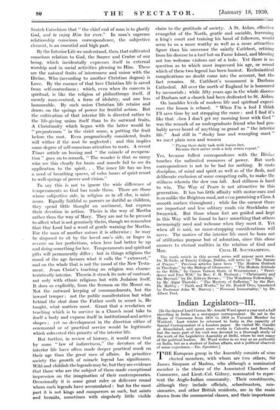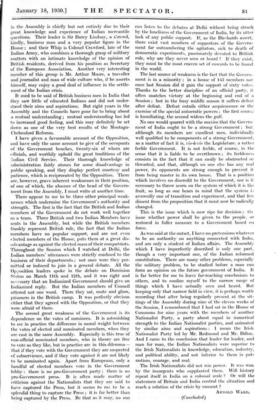Indian Legislators—III.
[In the days of Lord Curzon Mr. Arnold Ward spent a year and a half travelling in India as a newspaper correspondent. He sat in the House of Commons from 1910 to 1918 as Unionist Member for Watford. Last winter he returned to India in the capacity of Special Correspondent of a London paper. He visited Mr. Gandhi at Ahmedabad, and spent some weeks in Calcutta and Bombay, but the main part of his visit was devoted to a thorough study of the work of the Legislative Assembly at Delhi, where he met many of the political leaders. Mr. Ward writes in no way as an authority on India, but as a student of Indian affairs, and a political observer of some experience.—En. Spectator.] THE European group in the. Assembly consists of nine elected members, with whom are two others, Sir James Simpson of Madras, who although a nominated member is the choice of the Associated Chambers of Commerce, and Lieut.-Col. Gidney, nominated to repre- sent the Anglo-Indian community. Their constituents, although they include officials, .schoolmasters, mis- sionaries, and other British residents, are in the main drawn from the commercial classes, and their importance in the Assembly is chiefly but not entirely due to their great knowledge, and experience of Indian mercantile questions. Their leader is Sir Darcy Lindsay, a shrewd, kindly, business man and a very popular figure in the House ; and their Whip is Colonel Crawford, late of the Indian Army, who combines a thorough grasp of military matters with an intimate knowledge of the opinion of British residents, derived from his position as Secretary of the European Association. Another very interesting member of this group is Mr. Arthur Moore, a traveller and journalist and man of wide culture who, if he asserts himself, may enjoy a good deal of influence in the settle- ment of the Indian crisis.
It used to be said of British business men in India that they saw little of educated Indians and did not under- stand their aims and aspirations. But eight years in the Assembly and the. Councils have gone far to bring about a mutual understanding ; mutual understanding has led to increased good feeling, and this may definitely be set down as one of the very best results of the Montagu- Chelmsford Reforms.
I have given a favourable account of the Opposition, and have only the same account to give of the occupants of the Government benches, twenty-six of whom are officials, and worthily uphold the great traditions of the Indian Civil Service. Their thorough knowledge of administration fairly atones for some disadvantage in public speaking, and they display perfect courtesy and patience, which is reciprocated by the Opposition. There are, however, grave inherent weaknesses in their position, of one of which, the absence of the head of the Govern- ment from the Assembly, I must write at another time.
There appear to me to be three other principal weak- nesses which undermine the Government's authority and strength. The first is the fact that the British and Indian members of the Government do not work well together as a team. Three British and two Indian Members have seats in the Assembly, but while the British members frankly represent British rule, the fact that the Indian members have no popular support, and are not even elected members of the House, puts them at a great dis- advantage as against the elected mass of their compatriots. Throughout the Session which I watched at Delhi, the Indian members' utterances were strictly confined to the business of their departments ; not once were they per- mitted or induced to join in a general debate. All the Opposition leaders spoke in the debate on Dominion Status on March 11th and 12th, and it was right and necessary that an Indianized Government should give an Indianized reply. But the Indian members of Council uttered not one word. There they sat, mute and glum, prisoners in the British camp. It was perfectly obvious either that they agreed with the Opposition, or that they were afraid of them.
The second great weakness of the Government is its dependence on the votes of nominees. It is astonishing to see in practice the difference in moral weight between the votes of elected and nominated members, when they are cast in the same Assembly. Especially is this true of non-official nominated members, who in theory are free to vote as they like, but in practice are in this dilemma— that if they vote with the Government they are suspected of subservience, and if they vote against it are not likely to be nominated again. Apart from Europeans, only a handful of elected members vote in the Government lobby : there is no pro-Government party ; there is no pro-Government press. It is often made matter of criticism against the Nationalists that they are said to have captured the Press, but it seems to me to be a splendid thing to capture the Press ; it is far better than being captured by the Press. Be that as it may, no one can listen to the debates at Delhi without being struck by the loneliness of the Government of India, by its utter lack of any public support. If, as the Die-hards assert, there exist vast numbers of supporters of the Govern- ment far outnumbering the agitators, sick to death of democratic experiments, passionately devoted to British rule, why are they never seen or heard ? If they exist, they must be the most craven set of cowards to be found in the world.
The last source of weakness is the fact that the Govern- ment. is in a minority ; in a house of 145 members not once last Session did it gain the support of sixty votes. Thanks to the better discipline of an official party, it often snatches victory at the beginning and end of a Session ; but in the busy middle season it suffers defeat after defeat. Defeat entails either acquiescence or the exercise of the special autocratic powers ; the first course is humiliating, the second widens the gulf.
No one would quarrel with the maxim that the Govern- ment of India ought to be a strong Government ; but, although its members are excellent men, individually well qualified to be components of a strong Government, as a matter of fact it is, vis-6,-vis the Legislature, a rather feeble Government. It is not feeble, of course, in the sense that it is liable to be overthrown ; its feebleness consists in the fact that it can easily be obstructed or thwarted, and that, although no one else has any real power, its opponents are strong enough to prevent it from being master in its own house. That is a position which involves no discredit to the Government, nor is it necessary to throw scorn on the system of which it is the fruit, so long as one bears in mind that the system i avowedly one of transition and experiment, and that few dissent from the proposition that it must now be radically changed.
This is the issue which is now ripe for decision ; the issue whether power shall be given to the people, or restored in fuller measure to a Government based on force.
As was said at the outset, I have no pretensions whatever to be an authority on anything connected with India, and am only a student of Indian affairs. The Assembly which I have imperfectly described is only one part, though a very important one, of the Indian reformed constitution. There are many other problems, especially the military problem, to be studied before a man can form an opinion on the future government of India. It is far better for me to leave far-reaching conclusions to others, and to confine myself to the narrow range of things which I have actually seen and heard. But keeping only that narrow field in view, it is perhaps worth recording that after being regularly present at the sit- tings of the Assembly during nine of the-eleven weeks of the Session, I remembered that I had sat in the House of Commons for nine years with the members of another Nationalist Party, a party about equal in numerical strength to the Indian Nationalist parties, and animated by similar aims and aspirations : I mean the Irish Nationalist Party led by Mr. Redmond and Mr. Dillon. And I came to the conclusion that leader for leader, and man for man, the Indian Nationalists were superior to the Irish Nationalists in knowledge, education, industry, and political ability, and not inferior to them in pat- riotism, courage, and zeal.
. The Irish Nationalists did not win power. It was won by the insurgents who supplanted them. Will history► repeat itself in India on a colossal scale ? Or will the statesmen •of Britain and India control the situation and reach a solution of the crisis by consent?
(Concluded) ARNOLD WARD*







































 Previous page
Previous page